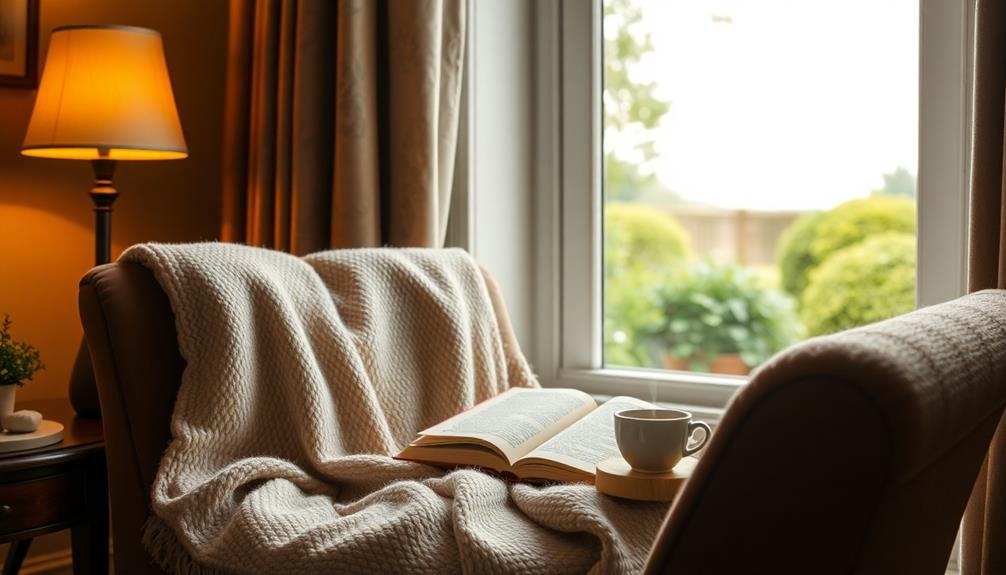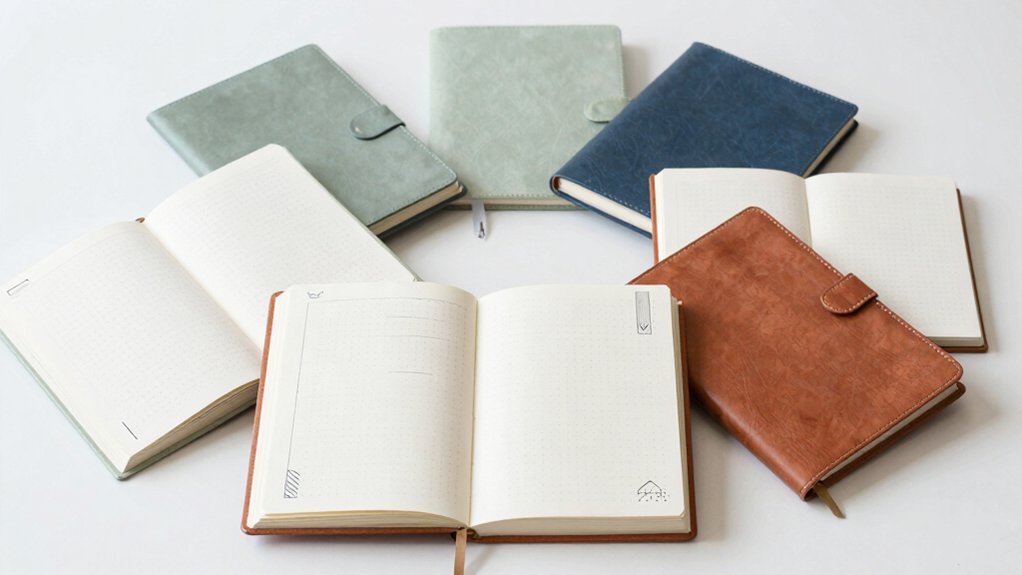To manage anxiety through reading, start by choosing calming genres like nature writing or light-hearted fiction. Create a dedicated reading routine, incorporating mindful practices like deep breathing before you begin. Explore self-help books with evidence-based techniques, and consider joining a book club for support. Read aloud to engage multiple senses, and visualize peaceful settings from your books. Try audiobooks for a multi-sensory experience, and discuss your readings with supportive friends. Keep a reading journal to track your progress and reflect on your emotions. By implementing these bibliotherapy tips, you'll discover powerful tools to ease your anxiety and find inner peace.
Choose Calming Genres

Several genres can help alleviate anxiety through bibliotherapy. When selecting books to manage your anxiety, consider genres that promote relaxation and positive thinking.
Nature writing, for example, can transport you to serene landscapes, helping you escape stressful thoughts. Poetry, with its rhythmic patterns and evocative imagery, can soothe your mind and encourage mindfulness.
Self-help books focused on anxiety management provide practical strategies and coping mechanisms. They'll give you tools to understand and address your anxiety directly. Mindfulness and meditation guides offer techniques to calm your mind and stay present.
You might find comfort in light-hearted fiction, such as cozy mysteries or gentle romances. These stories often feature relatable characters overcoming challenges, which can inspire hope.
Fantasy and science fiction can offer escapism, allowing you to immerse yourself in imaginative worlds far removed from your everyday worries.
Avoid genres that might trigger anxiety, such as intense thrillers or horror stories. Instead, opt for books that leave you feeling uplifted and peaceful.
Create a Reading Routine
Once you've chosen calming genres, establishing a consistent reading routine can amplify the anxiety-reducing benefits of bibliotherapy. Set aside dedicated time each day for reading, preferably in a quiet, comfortable space. This routine will help your mind associate reading with relaxation and create a sense of stability in your daily life.
Consider incorporating the following elements into your reading routine:
| Time of Day | Reading Activity |
|---|---|
| Morning | Poetry or affirmations |
| Lunchtime | Short stories or articles |
| Afternoon | Non-fiction or self-help |
| Evening | Fiction or biography |
| Before bed | Calming, light reads |
Start with small, achievable goals, such as reading for 15 minutes daily. Gradually increase your reading time as you become more comfortable with the routine. Don't pressure yourself to finish books quickly; instead, focus on the experience of reading and how it makes you feel. If you miss a day, don't be hard on yourself. Simply resume your routine the next day. By consistently engaging with calming literature, you'll train your brain to enter a more relaxed state when you pick up a book, making reading an effective tool for managing anxiety.
Practice Mindful Reading

Mindful reading can greatly enhance the anxiety-reducing effects of bibliotherapy. When you practice mindful reading, you're fully present with the text, absorbing each word and idea without distraction. This technique helps you engage more deeply with the material and maximize its therapeutic benefits.
To practice mindful reading, start by finding a quiet, comfortable space where you won't be interrupted. Take a few deep breaths to center yourself before opening your book. As you read, pay close attention to the words, visualizing the scenes and connecting with the characters or concepts. If your mind wanders, gently bring your focus back to the text without judgment.
To deepen your mindful reading practice, try these techniques:
- Read aloud to engage multiple senses
- Pause periodically to reflect on what you've read
- Jot down key insights or emotions that arise
Explore Self-Help Books
Why limit yourself to fiction when bibliotherapy offers a wealth of self-help books specifically designed to address anxiety? These books can provide valuable insights, coping strategies, and practical exercises to help you manage your anxiety more effectively.
When exploring self-help books, look for titles written by reputable mental health professionals or authors with expertise in anxiety management. Seek out books that offer evidence-based techniques, such as cognitive-behavioral therapy (CBT) or mindfulness practices.
You'll find guides on various anxiety-related topics, from general anxiety disorders to specific phobias.
As you read, take an active approach. Highlight key passages, jot down notes, and try out the suggested exercises. Don't rush through the book; instead, take your time to absorb and implement the strategies.
Consider keeping a journal to track your progress and reflect on how different techniques work for you.
Join a Book Club

While self-help books offer valuable guidance, joining a book club can amplify the benefits of bibliotherapy for anxiety. Engaging with others who share your interest in literature creates a supportive environment for discussing thoughts, emotions, and experiences related to anxiety.
You'll gain diverse perspectives on coping strategies and interpretations of anxiety-related themes in books. Choose a book club that focuses on genres or topics aligned with your interests and anxiety management goals.
Look for groups that meet regularly, either in-person or virtually, to maintain consistency in your bibliotherapy practice. As you participate, you'll develop valuable skills that can help manage anxiety:
- Active listening
- Empathy for others' experiences
- Articulating your thoughts and feelings
Don't hesitate to suggest books that specifically address anxiety or mental health topics. This can lead to meaningful discussions about coping mechanisms and personal growth.
Keep a Reading Journal
Keeping a reading journal is a powerful tool in your bibliotherapy arsenal for managing anxiety. It allows you to reflect on your reading experiences, track your progress, and identify patterns in your emotional responses to different books. You'll gain deeper insights into how literature affects your mood and anxiety levels.
To start your reading journal, choose a format that works for you—whether it's a physical notebook or a digital app. Record the title, author, and date you begin each book. As you read, jot down quotes that resonate with you, characters you relate to, and how the story makes you feel.
Here's a simple template to structure your journal entries:
| Date | Book Title | Reflections |
|---|---|---|
| [Date] | [Title] | [Your thoughts] |
| [Date] | [Title] | [Your thoughts] |
| [Date] | [Title] | [Your thoughts] |
| [Date] | [Title] | [Your thoughts] |
Regularly review your journal to identify themes or genres that consistently help reduce your anxiety. This practice will guide your future reading choices and enhance the effectiveness of your bibliotherapy journey. Don't forget to celebrate your progress and the positive impact reading has on your mental well-being.
Read Aloud for Relaxation

Beyond silent reading, reading aloud can be a powerful relaxation technique for those struggling with anxiety. When you vocalize words, you're engaging multiple senses and focusing your mind on the present moment. This practice can help calm racing thoughts and reduce stress levels.
To maximize the relaxation benefits of reading aloud, choose texts that you find soothing or uplifting. Poetry, with its rhythmic qualities, can be particularly effective. As you read, pay attention to your breathing and try to maintain a slow, steady pace. This can help regulate your heart rate and promote a sense of calm.
Consider incorporating reading aloud into your daily routine for anxiety management. You might:
- Start your day with a positive affirmation or short poem
- Take a midday break to read a calming passage
- End your evening with a chapter from a comforting book
Visualize Peaceful Book Settings
With bibliotherapy, you can harness the power of your imagination to create calming mental spaces. When reading, pay close attention to peaceful settings described in your chosen books. Whether it's a serene beach, a tranquil forest, or a cozy cottage, let these environments come to life in your mind.
As you read, pause periodically to fully immerse yourself in these settings. Close your eyes and visualize the details: the colors, textures, sounds, and smells. Imagine yourself physically present in these calming locations. Feel the warmth of the sun, hear the rustling of leaves, or smell the salty sea air.
Practice this visualization technique regularly to build a mental library of peaceful places you can revisit when anxiety strikes. You'll find that these book-inspired sanctuaries can serve as powerful tools for managing stress and promoting relaxation.
Don't limit yourself to obvious peaceful settings. Even in action-packed stories, you can often find moments of tranquility. Look for descriptions of characters finding solace in nature, quiet moments of reflection, or scenes of comfort and safety. These, too, can become valuable visualizations for anxiety relief.
Utilize Audiobooks for Anxiety

While visualization techniques offer powerful anxiety relief, audiobooks present another valuable tool in your bibliotherapy arsenal. They provide a unique, immersive experience that can help soothe your anxious mind. When you're feeling overwhelmed, slip on your headphones and let a calming narrator's voice transport you to another world.
Audiobooks are particularly effective for anxiety management because they:
- Engage multiple senses, distracting you from anxious thoughts
- Allow you to practice mindfulness by focusing on the story
- Provide a soothing auditory experience, especially with well-chosen narrators
To maximize the anxiety-reducing benefits of audiobooks, choose genres and narrators that resonate with you. Opt for stories with positive themes or gentle pacing. Nature documentaries, self-help books, or light-hearted fiction can be excellent choices. You can also experiment with different narration speeds to find what works best for you.
Don't limit yourself to listening only when anxious. Make audiobooks a regular part of your routine, such as during your commute or while doing chores. This consistent exposure can help build resilience and provide a reliable coping mechanism for future anxiety-inducing situations.
Discuss Books With Supportive Friends
Sharing your reading experiences with supportive friends can greatly enhance the therapeutic effects of bibliotherapy for anxiety. When you discuss books with others, you're not only processing the content but also gaining new perspectives and insights. Choose friends who are empathetic and understanding of your anxiety, as they'll provide a safe space for open dialogue.
Organize regular book discussions or join a book club focused on self-help or anxiety-related literature. This structure will keep you accountable and motivated to read consistently. During these conversations, share how certain passages or characters resonated with your experiences. Ask your friends about their interpretations and how they might apply the book's lessons to their own lives.
Don't limit yourself to just talking about the content. Discuss how the act of reading itself affects your anxiety levels. You might find that your friends have similar experiences or can offer additional coping strategies.
Frequently Asked Questions
Can Bibliotherapy Replace Professional Mental Health Treatment for Anxiety?
Bibliotherapy can't replace professional mental health treatment for anxiety. While reading can be helpful, it's not a substitute for professional care. You should use it as a complementary tool alongside therapy and medical advice for best results.
Are There Specific Books Proven to Reduce Anxiety Symptoms?
While there's no universal "proven" book for anxiety reduction, you'll find many evidence-based options. "The Anxiety and Phobia Workbook" by Edmund Bourne and "The Worry Cure" by Robert Leahy are frequently recommended by professionals for their effective techniques.
How Long Does It Take to See Results From Bibliotherapy?
You'll likely notice results from bibliotherapy within a few weeks of consistent practice. It's different for everyone, but you'll often feel calmer and more focused after just a few reading sessions. Stick with it for best results.
Can Reading Fictional Stories Be as Effective as Non-Fiction for Anxiety?
Yes, reading fictional stories can be as effective as non-fiction for anxiety. You'll find that both genres offer unique benefits. Fiction can help you escape and relax, while non-fiction provides practical strategies. Choose what resonates with you most.
Are There Any Potential Negative Effects of Using Bibliotherapy for Anxiety?
You should be aware that bibliotherapy for anxiety might have some drawbacks. It's not a substitute for professional help, and you could become overly reliant on books. Additionally, you might misinterpret advice or avoid addressing underlying issues.
In Summary
You've now got a toolbox of bibliotherapy techniques to help manage your anxiety through reading. Remember, it's not just about what you read, but how you engage with the text. Experiment with these strategies to find what works best for you. Whether it's losing yourself in a calming story, learning new coping skills, or connecting with others through books, reading can be a powerful ally in your journey to reduce anxiety and find peace.





Leave a Reply